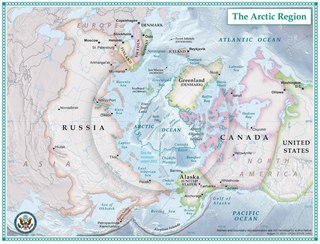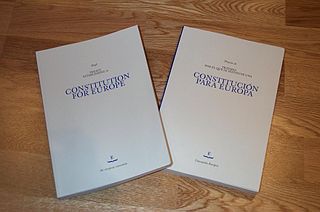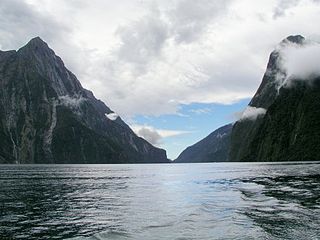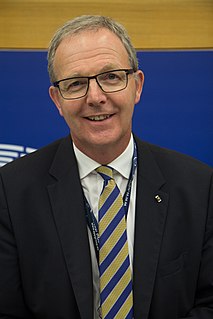Related Research Articles

The Antarctic is a polar region around Earth's South Pole, opposite the Arctic region around the North Pole. The Antarctic comprises the continent of Antarctica, the Kerguelen Plateau and other island territories located on the Antarctic Plate or south of the Antarctic Convergence. The Antarctic region includes the ice shelves, waters, and all the island territories in the Southern Ocean situated south of the Antarctic Convergence, a zone approximately 32 to 48 km wide varying in latitude seasonally. The region covers some 20 percent of the Southern Hemisphere, of which 5.5 percent is the surface area of the Antarctica continent itself. All of the land and ice shelves south of 60°S latitude are administered under the Antarctic Treaty System. Biogeographically, the Antarctic realm is one of eight biogeographic realms of Earth's land surface.

The Council of the European Union, often referred to in the treaties and other official documents simply as the Council, and informally known as the Council of Ministers, is the third of the seven Institutions of the European Union (EU) as listed in the Treaty on European Union. It is one of three legislative bodies and together with the European Parliament serves to amend and approve or veto the proposals of the European Commission, which holds legislative initiative.

The European Union (EU) is a political and economic union of 27 member states that are located primarily in Europe. The union has a total area of 4,233,255.3 km2 (1,634,469.0 sq mi) and an estimated total population of about 447 million. An internal single market has been established through a standardised system of laws that apply in all member states in those matters, and only those matters, where the states have agreed to act as one. EU policies aim to ensure the free movement of people, goods, services and capital within the internal market; enact legislation in justice and home affairs; and maintain common policies on trade, agriculture, fisheries and regional development. Passport controls have been abolished for travel within the Schengen Area. The eurozone is a monetary union established in 1999, coming into full force in 2002, that is composed of the 19 EU member states that use the euro currency. The EU has often been described as a sui generis political entity with the characteristics of either a federation or confederation.

The European Parliament (EP) is one of three legislative branches of the European Union and one of its seven institutions. Together with the Council of the European Union, it adopts European legislation, commonly on the proposal of the European Commission. The Parliament is composed of 705 members (MEPs). It represents the second-largest democratic electorate in the world and the largest trans-national democratic electorate in the world.

The Arctic is a polar region located at the northernmost part of Earth. The Arctic consists of the Arctic Ocean, adjacent seas, and parts of Alaska, Canada, Finland, Greenland (Denmark), Iceland, Norway, Russia, and Sweden. Land within the Arctic region has seasonally varying snow and ice cover, with predominantly treeless permafrost containing tundra. Arctic seas contain seasonal sea ice in many places.

The Treaty establishing a Constitution for Europe was an unratified international treaty intended to create a consolidated constitution for the European Union (EU). It would have replaced the existing European Union treaties with a single text, given legal force to the Charter of Fundamental Rights, and expanded qualified majority voting into policy areas which had previously been decided by unanimity among member states.

The terms international waters or trans-boundary waters apply where any of the following types of bodies of water transcend international boundaries: oceans, large marine ecosystems, enclosed or semi-enclosed regional seas and estuaries, rivers, lakes, groundwater systems (aquifers), and wetlands.

The special territories of the European Union are 32 territories of EU member states which, for historical, geographical, or political reasons, enjoy special status within or outside the European Union.

Diana Paulette Wallis, is a British former Liberal Democrat Member of the European Parliament (MEP) for Yorkshire and the Humber. Wallis was first elected in 1999 and re-elected in 2004 and in 2009. She resigned her seat in January 2012 and went on to pursue an extensive array of academic, legal and mediation-related activities.

The Directorate-General for European Civil Protection and Humanitarian Aid Operations, formerly known as the European Community Humanitarian Aid Office, is the European Commission's department for overseas humanitarian aid and for civil protection. It aims to save and preserve life, prevent and alleviate human suffering and safeguard the integrity and dignity of populations affected by natural disasters and man-made crises. Since September 2019, Janez Lenarčič is serving as Commissioner for Crisis Management in the Von der Leyen Commission.

Marine protected areas (MPA) are protected areas of seas, oceans, estuaries or in the US, the Great Lakes. These marine areas can come in many forms ranging from wildlife refuges to research facilities. MPAs restrict human activity for a conservation purpose, typically to protect natural or cultural resources. Such marine resources are protected by local, state, territorial, native, regional, national, or international authorities and differ substantially among and between nations. This variation includes different limitations on development, fishing practices, fishing seasons and catch limits, moorings and bans on removing or disrupting marine life. In some situations, MPAs also provide revenue for countries, potentially equal to the income that they would have if they were to grant companies permissions to fish. The value of MPA to mobile species is unknown.

In the European Union (EU), enhanced cooperation is a procedure where a minimum of nine EU member states are allowed to establish advanced integration or cooperation in an area within EU structures but without the other members being involved. As of October 2017, this procedure is being used in the fields of the Schengen acquis, divorce law, patents, property regimes of international couples, and European Public Prosecutor and is approved for the field of a financial transaction tax.

European Union–Pakistan relations are the international relations between the common foreign policy and trade relations of the European Union and the Islamic Republic of Pakistan.

The area of freedom, security and justice (AFSJ) is a collection of home affairs and justice policies designed to ensure security, rights and free movement within the European Union (EU). Areas covered include the harmonisation of private international law, extradition arrangements between member states, policies on internal and external border controls, common travel visa, immigration and asylum policies and police and judicial cooperation.

Arctic cooperation and politics are partially coordinated via the Arctic Council, composed of the eight Arctic nations: the United States, Canada, Iceland, Norway, Sweden, Finland, Russia, and Denmark with Greenland and the Faroe Islands. The dominant governmental power in Arctic policy resides within the executive offices, legislative bodies, and implementing agencies of the eight Arctic nations, and to a lesser extent other nations, such as United Kingdom, Germany, European Union and China. NGOs and academia play a large part in Arctic policy. Also important are intergovernmental bodies such as the United Nations and NATO.

Axel Voss is a German lawyer and politician of the Christian Democratic Union of Germany. He has been a Member of the European Parliament since 2009 and became coordinator of the European People's Party group in the Committee on Legal Affairs in 2017. His parliamentary work focuses on digital and legal topics.
Save the Arctic is a Greenpeace campaign to protect the Arctic, principally by preventing oil drilling and unsustainable industrial fishing in the area completely, surrounded by an Arctic-Environmental economics-Zone. The campaign, begun in 2012, calls for a sanctuary in the uninhabited high seas area around the North Pole, similar to the Protocol on Environmental Protection to the Antarctic Treaty. The campaign aims to begin this process by prompting a United Nations resolution on protection for the Arctic. Due to Russian invasion in Ukraine, world's 13% oil reserves could be a melting point in the Arctic.

The Treaties of the European Union are a set of international treaties between the European Union (EU) member states which sets out the EU's constitutional basis. They establish the various EU institutions together with their remit, procedures and objectives. The EU can only act within the competences granted to it through these treaties and amendment to the treaties requires the agreement and ratification of every single signatory.
The European Union policy for disabled people guarantees governmental responsibility for all disabled people in all of the EU's 27 member states. This policy operates in the framework of the subsidiarity principle: if possible, one should improve at the national level, though in principle the EU will refrain from setting hefty laws in this area. Through the activities of the Council of Europe and the United Nations, the EU disability policy has since been in effect in many EU countries for years.

The 9th European Parliament was elected in the 2019 elections and is to last until the 2024 elections.
References
- ↑ Tom Barry; Hólmgrímur Helgason; Soffía Guðmundsdóttir. "Arctic Protected Areas Indicator Report 2017" (PDF). Retrieved 6 December 2018.
- ↑ "Legal Instruments for Marine Sanctuary in the High Arctic". ResearchGate.
- ↑ "Texts adopted - Thursday, 9 October 2008 - Arctic Governance - P6_TA(2008)0474". www.europarl.europa.eu.
- ↑ http://www.europarl.europa.eu/sides/getDoc.do?pubRef=-//EP//NONSGML+MOTION+B7-2014-0228+0+DOC+PDF+V0//EN [ bare URL PDF ]
- ↑ "Huge worldwide support for Arctic sanctuary: Greenpeace poll". phys.org.
- ↑ "Pianist performs in Arctic to raise awareness". Popular Mechanics. 21 June 2016.